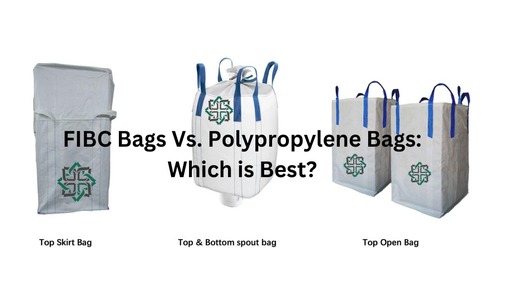
In the world of industrial packaging, the choice of materials plays a crucial role in ensuring the safe and efficient transport and storage of goods. Two popular options that often come up in discussions are FIBC (Flexible Intermediate Bulk Containers) bags and polypropylene (PP) bags. Each type of bag offers unique advantages and is suited for different applications. In this blog, we’ll compare FIBC bags and polypropylene bags to help you determine which is the best packaging solution for your needs.
What Are FIBC Bags?
FIBC bags, also known as bulk bags or big bags, are large, flexible containers made from woven polypropylene fabric. They are designed to carry and store bulk materials, ranging from powders and granules to large, heavy items. FIBC bags are commonly used in industries such as agriculture, construction, chemicals, and food processing.
Key Features of FIBC Bags:
High Load Capacity: FIBC bags can carry heavy loads, typically ranging from 500 kg to 2000 kg.
Durability: Made from high-strength woven polypropylene, FIBC bags are robust and resistant to tearing.
Versatility: Available in various designs and sizes, FIBC bags can be customized to meet specific requirements.
Reusable: Many FIBC bags are designed for multiple uses, making them a cost-effective packaging solution.
Ease of Handling: Equipped with sturdy lifting loops, FIBC bags can be easily handled using forklifts and cranes.
What Are Polypropylene Bags?
Polypropylene bags, often referred to as PP bags, are smaller, lightweight bags made from woven polypropylene fabric. They are widely used for packaging and transporting smaller quantities of goods, such as grains, flour, sand, and cement. PP bags are prevalent in various sectors, including agriculture, construction, and retail.
Key Features of Polypropylene Bags:
Lightweight: PP bags are lightweight, making them easy to handle and transport.
Durability: Despite being lightweight, PP bags are strong and resistant to punctures and tears.
Cost-Effective: PP bags are generally less expensive than FIBC bags, making them a cost-effective option for packaging smaller quantities.
Versatility: Available in various sizes and designs, PP bags can be used for a wide range of applications.
Moisture Resistance: PP bags can be coated to provide protection against moisture, ensuring the integrity of the contents.
Comparing FIBC Bags and Polypropylene Bags
When deciding between FIBC bags and polypropylene bags, several factors should be considered, including load capacity, durability, cost, and specific application requirements.
Load Handling Capacity
FIBC Bags: With a high load capacity, FIBC bags are ideal for transporting and storing large quantities of materials. They can handle weights ranging from 500 kg to 2000 kg or more.
Polypropylene Bags: PP bags are suitable for smaller loads, typically up to 50 kg. They are ideal for packaging smaller quantities of goods.
Durability and Strength
FIBC Bags: FIBC bags are constructed from high-strength woven polypropylene, making them extremely durable and resistant to tearing. They are designed to withstand the rigors of handling and transport.
Polypropylene Bags: PP bags, while durable, are not as robust as FIBC bags. They are more prone to punctures and tears but still offer good strength for smaller loads.
Cost-Effectiveness
FIBC Bags: Although FIBC bags are more expensive upfront, their high load capacity and reusability make them a cost-effective solution for bulk packaging in the long run.
Polypropylene Bags: PP bags are less expensive than FIBC bags and are a more economical choice for packaging smaller quantities. However, they are typically single-use, which can increase long-term costs.
Versatility in Applications
FIBC Bags: FIBC bags are highly versatile and can be customized for various applications, including hazardous materials, food-grade products, and construction materials.
Polypropylene Bags: PP bags are also versatile but are more suited for smaller quantities of goods. They are commonly used in agriculture, retail, and small-scale industrial applications.
Environmental Impact
FIBC Bags: FIBC bags are often reusable, reducing the environmental impact associated with single-use packaging. They can be recycled at the end of their lifespan.
Polypropylene Bags: PP bags are typically single-use, which can contribute to environmental waste. However, they can also be recycled, mitigating some of their environmental impact.
Efficiency in Storage and Transport
FIBC Bags: FIBC bags enhance storage and transport efficiency by allowing large quantities of materials to be handled in a single container. Their sturdy lifting loops facilitate easy handling with machinery.
Polypropylene Bags: PP bags are efficient for storing and transporting smaller quantities of goods. Their lightweight nature makes them easy to handle manually, but they do not offer the same efficiency as FIBC bags for bulk transport.
Applications of FIBC Bags and Polypropylene Bags
FIBC Bags:
Agriculture: Transporting and storing grains, seeds, fertilizers, and animal feed.
Construction: Handling bulk materials such as sand, gravel, cement, and construction waste.
Chemicals: Packaging and transporting powdered and granular chemicals.
Food Processing: Storing and transporting bulk food ingredients, such as sugar, flour, and salt.
Polypropylene Bags:
Agriculture: Packaging and transporting smaller quantities of grains, seeds, and fertilizers.
Construction: Handling materials such as sand, cement, and aggregates in smaller quantities.
Retail: Packaging products such as flour, rice, and pet food for retail distribution.
Small-Scale Industrial Applications: Storing and transporting smaller quantities of raw materials and finished products.
Conclusion
Both FIBC bags and polypropylene bags offer distinct advantages and are suited for different applications. FIBC bags are the best choice for handling large quantities of materials, providing durability, reusability, and cost-effectiveness for bulk packaging. On the other hand, polypropylene bags are ideal for smaller loads, offering a lightweight and economical packaging solution.
When selecting the best packaging solution for your needs, consider the specific requirements of your application, including load capacity, durability, cost, and environmental impact. Gravitas Packaging offers a wide range of high-quality FIBC bags and polypropylene bags tailored to meet the diverse needs of various industries. For more information on our products and how they can benefit your business, visit Gravitas Packaging.



Recent Comments